
Toronto has a vibrant food scene made up of diverse restaurants and markets across communities. Since the COVID-19 pandemic, there has been a surge of people ordering takeout rather than dining in, leading to increased use of single-use and takeaway items.
With a growing population and an increase in demand for quick food, Toronto’s waste is anticipated to grow and landfill capacity in Ontario is estimated to run out in the next ten years. The City is working on updating its Long-term Waste Management Strategy to better anticipate future needs, identify options to reduce waste, and minimize the amount of garbage requiring disposal in the City’s Green Lane Landfill. At the same time, the City is also working to transition to a circular economy where we have solutions to avoid making waste in the first place.
In 2024, the Circular Food Innovators Fund was launched to support local small businesses (both for-profit and not-for-profit) to implement reuse systems that replace single-use and takeaway items with reusable foodservice ware. Over the past year, nine grant recipients have been working to implement innovative solutions for food and beverage packaging. Read the success stories below.
Total Funding Awarded: $28,279
ChocoSol Traders, a Toronto-based chocolate and coffee company, has been reducing its use of disposable cups since 2019 when it partnered with a reusable cup provider. However, some customers were reluctant to create an account and pay a deposit for a reusable cup.
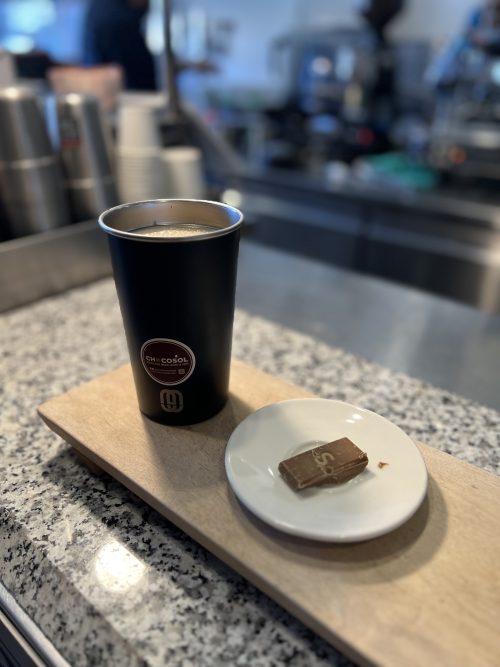
To address these concerns, ChocoSol used the Circular Food Innovators Fund to help fund the launch of a new reusable cup initiative at its St. Clair and St. Lawrence Market locations. The new program used a rewards-based model, rather than a deposit-based model, with no sign-up requirement. Over the course of the year, ChocoSol increased their reusable cup inventory from 100 cups to 680 cups, and the number of customers choosing the reusable option increased from 100 cups per month in 2024 to nearly 300 reusable cups per month in May 2025. Every time a customer chose a reusable cup, they avoided sending a disposable cup to landfill.
ChocoSol’s approach of starting small and pivoting based on customer feedback demonstrates how reuse can be scaled effectively. Through collaboration and thoughtful design, even a simple reusable cup can spark meaningful change.
Total Funding Awarded: $23,400
Every day, thousands of disposable cups are tossed out at events across Toronto, creating significant landfill impacts. Circulr, a local reuse company that got its start by creating a reuse platform for producers in grocery stores, is expanding their business to include providing reusable cups at stadiums, theatres, festivals and community events.
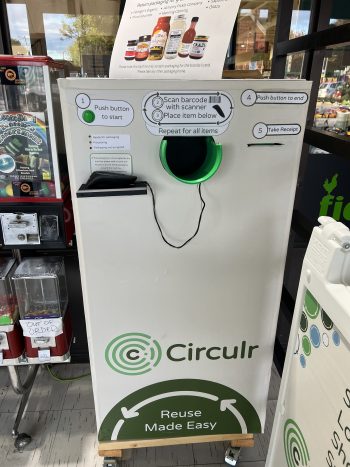
With support from a Circular Food Innovators Fund grant, Circulr hired a co-op student to conduct market research and connect with over 700 event organizers citywide. There has been a high level of interest in the program from small event spaces eager to use branded reusable cups as a marketing opportunity for repeat events.
To make cup returns easier, Circulr also used the grant to upgrade their reverse vending machine technology. Their new smart return receptacle is ready to roll out, so keep an eye out for Circulr’s reusable cups at events near you.
Total Funding Awarded: $30,000
In 2023, Evergreen conducted a waste audit at their Saturday Farmers Market and found that most of the trash from the market came from single-use food packaging and disposable cups from food and drinks being consumed at the market.
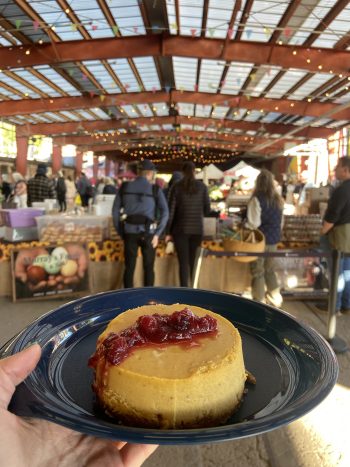
To address this, Evergreen launched the Reusable Dishware Pilot using Circular Food Innovators Fund grant funding. The program offers reusable plates, bowls, cups and cutlery at no cost to customers, year-round at the market.
Over the past year, the pilot has grown into a key part of Evergreen’s operations. Reusables now replace disposables not only at the market but also at some of the organization’s biggest events.
Participation continues to rise, and the program is now a core part of the Farmers Market experience. Thanks to staff and volunteer training, equipment upgrades and outreach efforts, Evergreen has cut event waste by 50 per cent, replacing more than 207,000 single-use items with reusable alternatives. That’s the equivalent of keeping 7,700 pounds of waste out of landfill (and counting).
The reuse system is now fully integrated into weekly operations and the program has attracted attention from other organizations and events looking to implement similar systems, showing growing interest in circular waste solutions across the city.
Total Funding Awarded: $28,670
Feed Scarborough runs four food banks, including a virtual food bank, Healthy Meal Program, and personal and professional development programs to support community resilience. In 2024, they launched Food Hall TO, a food court incubator that helps newcomers and youth gain hands-on experience in food entrepreneurship.
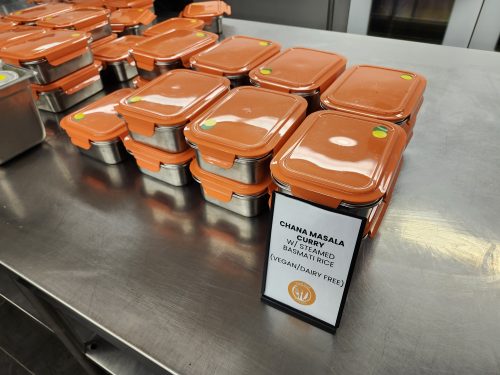
To reduce waste and support the United Nations Sustainable Development Goals, Food Hall TO used a Circular Food Innovators Fund grant to introduce reusable containers for takeout orders. They started small, tested the system, and built trust with customers and vendors through clear communication and strong community partnerships. They also expanded the reuse system to their catering services, giving more organizations access to sustainable food service options.
The program is now using over 900 reusable containers per month. Over the course of the year, over 10,000 single-use containers avoided landfill, proving that small changes can have a big impact.
Total Funding Awarded: $35,000
Takeout is a common meal option for busy office workers, with most food being served in single-use containers. Inwit is changing that.
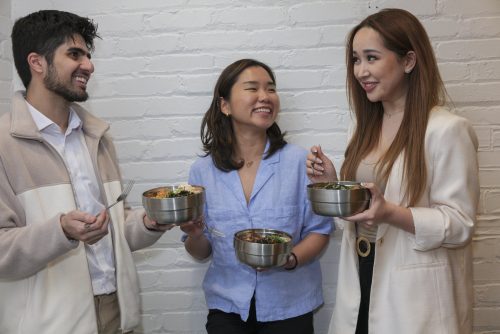
Their zero-waste takeout platform for sustainable corporate catering offers curated meals from multiple restaurants, delivered in insulated reusable containers by cargo bikes. They also provide impact reports for every order.
To keep up with growing demand, Inwit used a Circular Food Innovators Fund grant to upgrade their logistics and order management systems. Their new automated platform, integrated with the inwit.app, reduced Inwit’s processing time from three hours to under 20 minutes making zero-waste ordering as fast and easy as traditional delivery.
Over the course of a year, Inwit grew their business clients by 65 per cent, saved 3.5 tonnes of CO₂, and prevented the use of over 11,500 single-use items. They also source over 60 per cent of their goods and services locally, supporting the Canadian economy. Inwit is proving that sustainability and convenience can go hand in hand.
Total Funding Awarded: $34,600
Scadding Court Community Centre is a multi-service organization supporting underserved, culturally diverse communities. It is home to Market 707, one of Toronto’s most unique street food and retail markets that helps newcomers, youth and low-income racialized entrepreneurs access affordable retail space.
Single-use containers from Market 707 vendors were piling up, so Scadding Court built a reuse system from scratch with their Circular Food Innovators Fund grant. Working closely with vendors, they found reusable containers that fit each cuisine on offer. Through ongoing communication and feedback, they created a reuse system that works for vendors and customers.
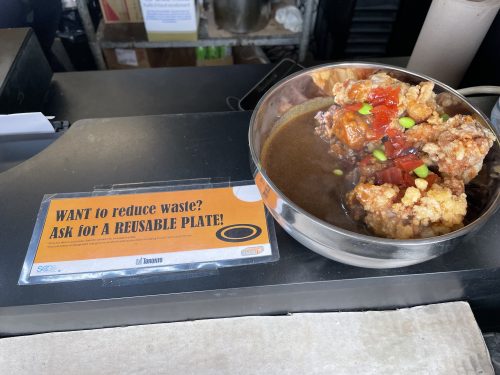
What started at Market 707 has grown into a centre-wide zero-waste movement at Scadding Court Community Centre. The program now eliminates the use of approximately 175 single-use containers every month, reducing litter, cutting vendor costs and helping to build a strong sense of community.
Vendors now share tips, mentor newcomers and proudly support the reuse system, turning Market 707 into a hub for sustainability and collaboration.
Total Funding Awarded: $35,000
Launched by Canada’s Clean50 Emerging Leader as a proof-of-concept pilot in October 2020, Suppli has built a technology platform to manage circular packaging for online ordering platforms, starting with reusable containers for food delivery.
With the Circular Food Innovators Fund grant funding, Suppli was able to improve their operations, container return process and promotional strategy, helping them grow their client base by 40 per cent and expand across Toronto. Through targeted campaigns and collaborations with Toronto influencers, they diversified their client list to include larger corporate catering clients and initiated a partnership working with one of the largest catering providers to film and television productions in Ontario.
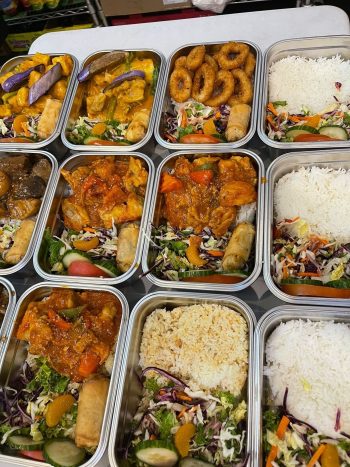
The funding also helped Suppli shift focus from individual takeout to high-volume Business-to-Business catering, which offers faster container returns and lower loss rates. Over the year, they avoided the use of 36,000 disposable containers while saving restaurants money on packaging. Many of Suppli’s partner restaurants are women- or minority-owned, and the company keeps its entire supply chain within Canada, supporting the local economy.
Total Funding Awarded: $12,925
Food festivals and summer go hand and hand in Toronto, but these events can generate a lot of waste in a short period of time.
The Taste of Lawrence, the largest street festival in Scarborough with an estimated 300,000 attendees annually, was looking to reduce waste from food and beverage vendors. To celebrate its 20th anniversary in 2024, the Wexford Heights Business Improvement Area (BIA) used a Circular Food Innovators Fund grant to partner with Friendlier, an organization that eliminates single-use food and beverage packaging by using reusable containers. The initiative aimed to make the festival one of Toronto’s first to adopt a circular food system.
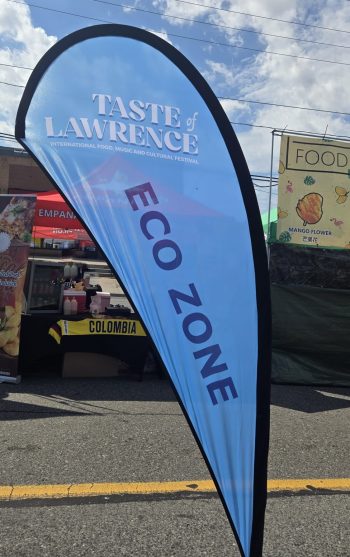
Through the creation of the Friendlier Eco-Zone, vendors received reduced booth fees and increased social media promotion if they opted to take part and offer their food and drinks in reusable dishware and cups. Over the three-day event, more than 2,000 attendees used reusable cups and dishes with a small refundable deposit.
The BIA hopes to bring the initiative back in future years, building on lessons learned and working with local environmental groups to improve and expand the program and show how communities can lead the way in environmental responsibility.
Total Funding Awarded: $34,626
York University is accelerating its sustainability efforts with a goal to reach net-zero emissions by 2040. In January 2025, the York University Student Centre launched the Reduce, Reuse, Repurpose project with funding support of the Circular Food Innovators Fund, introducing a reusable food container system at the Break Café to cut down on single-use waste across the Keele campus.
With a growing awareness of the environmental impact of disposable packaging, the initiative is focused on making sustainable choices as convenient as possible. York University students are able to access reusable containers at the Break Café for no additional cost, embedding sustainability into everyday, climate-friendly choices to reduce emissions.
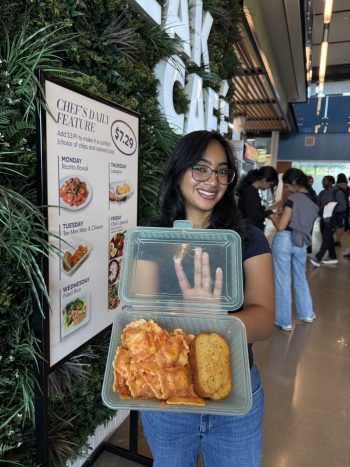
The project is a collaborative effort with zero-waste experts guiding the rollout, researchers tracking progress, and students, staff and faculty promoting the program on campus to raise awareness and engagement.
The program got off to a great start in early 2025 and the York University Student Centre is excited to refine it based on user feedback and see it grow in the second half of 2025. The goal is to replace 250 single-use containers per day and expand the system to all three York campuses across the Greater Toronto Area.